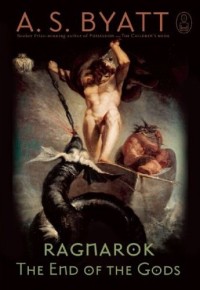Pure by Julianna Baggott
 Saturday, February 11, 2012 at 5:38AM
Saturday, February 11, 2012 at 5:38AM 
Published by Grand Central Publishing on February 8, 2012
Nine years after the Detonations, Pressia (who has a doll's head where her hand should be) is about to turn sixteen and is worried that she'll be picked up by the revolutionary group OSR and turned into a killer ... or perhaps a target. Her story initially alternates with that of Partridge, a boy who, though fortunate to live inside the Dome, resents his powerful father and wonders about his mother's fate. Inhabitants of the Dome think of those who live outside the dome as "wretches." The wretches disparagingly refer to those who live inside the Dome as "Pures." The wretches improbably experienced "mutations" during the Detonations; things they were carrying are now bonded with their bodies. Some less fortunate wretches fused with the earth, some fused with buildings, some with animals, some with machinery, some with other people (collections of people all fused together are called "Groupies"). All this fusing is supposedly the result of bombs that "disrupted cellular structures" combined with "nanotechnology that promotes the self-assembly of molecules." I'm not a scientist but his sounds more like doubletalk than science to me. If you can swallow the premise -- and it's difficult to take seriously a novel that gives new meaning to My Mother the Car -- Pure tells a surprisingly entertaining story.
Believing that his mother might still be alive, Partridge does the unthinkable: he leaves the Dome to search for her. It is of course inevitable that Pressia, fleeing from the OSR, will encounter Partridge, fleeing from the Dome. Although it seems that the story depends upon this fortuitous (and formulaic) coincidence, the plot is more complex than it first appears.
Pure is difficult to pigeonhole. It combines elements of a horror story (a wolfman carries off a child, a Dust creature reaches up from the ground to snatch Partridge) with a fantasy (the fused people strike me as more fantasy than science fiction), blends in a family drama, adds action scenes that echo The Hunger Games with a twist of Escape from New York, incorporates some Soviet-style darkness balanced with stirring heroism, and even sneaks in romantic subplots.
What to make of the resulting mashup? Labels aside, Pure is an appealing, smart, quirky addition to the ever-growing field of post-apocalyptic fiction. Although the plot is often derivative, the novel's strength lies in its characters. Except for a fused character who is very much like a two-headed character Harlan Ellison created for a short story and reprised in an episode of Masters of Science Fiction, Julianna Baggott's leading characters are unique individuals with surprisingly well developed personalities (something that is far too rare in fantasy and science fiction).
Dystopian fiction often offers a political point of view but it's rather subdued in Pure. In that regard, Baggott's best thought is that the prisons and "rehabilitation centers" of the future are built tall so that people know "that you live under their roof or in their shadow." Some of the wretches have developed odd religious beliefs -- they consider the Detonations to be punishment for their sins -- that cleverly reflect the oddness of some contemporary religious dogma. A group of (for lack of a better term) feminist wretches blame the mess that has been made of the world on men (a gender whose members are known to the women as "Deaths"); they prefer to live in a heavily armed collective. The mess came about, in part, because of the convolution of church and state. While all of this is interesting if not entirely original, the novel's larger message, I think, is that "when you live in a place of safety and comfort," it's easy to ignore the less fortunate who are hidden from your view. That's always worth remembering.
Still, Pure is more a well told story about troubled people than a novel of ideas. Neat plot twists require the characters to rethink their lives. Pressia's descriptions of her "heart-pounding" feelings for Bradwell occasionally come a bit too close to chick lit for my taste, but in most respects the writing is solid. Despite her deceptively ordinary prose, there's a poignancy in Baggott's writing that's rare in science fiction. Pure is a fine novel, one that makes me look forward to the remaining installments of Baggott's trilogy.
RECOMMENDED



